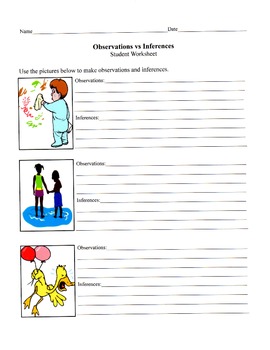

Again, observations are information we gather directly through our five senses…. Inferences are often changed when new observations are made. They are based on your past experiences and prior knowledge.

Inferences are an explanation for an observation you have made. What do observation and inference have in common? An example of observation is making the statement that a teacher is proficient from watching him teach several times.

An example of observation is the watching of Haley’s Comet. The definition of an observation is the act of noticing something or a judgment or inference from something seen or experienced. An inference is something you decide or think about a thing or event after you observe it.” Can you make an inference without any observation?Ĭan you make an inference without having made any observations? Yes, because it can be based on what your experience and what you observe. Your explanation, for example, could be, “An observation is something you sense: taste, touch, smell, see, or hear. Explain to the class what an observation and an inference are and the difference between the two. What is the example of observation and inference?ġ. Use the chart to demonstrate how an observation can lead to an inference. Based on those observations, we make inferences. Remind students that we use our five senses to make observations. Inference: something you think is true based on observations. How do you make an observation inference? Readers who make inferences use the clues in the text along with their own experiences to help them figure out what is not directly said, making the text personal and memorable. Making an inference involves using what you know to make a guess about what you don’t know or reading between the lines. Or if someone slams a door, you can infer that she is upset about something. For example, if you see someone eating a new food and he or she makes a face, then you infer he does not like it. You probably practice inference every day. Inference is using observation and background to reach a logical conclusion. Incorrect inferences may arise when the context in which an unfamiliar word occurs provides insufficient support for inferring the meaning (is low-constraining, vague or ambiguous). Why Can An Observation Not Be An Inference? – Related Questions Can inferences be incorrect? Suppose your friends went to the beach at noon on a warm day. An inference is a statement that explains the observations. This would be things that you see, hear, taste, smell, touch, or taste. Is this statement an observation or inference? An observation is anything that can be taken in through the senses. Explanation: As we can see, “observation” and “inferences” are words with very different meanings, so we can say that an observation cannot be an inference. Why can an observation Cannot be an inference? Because an observation refers to something real that can be observed whereas an inference refers to an assumption. What is difference between observation and inference? An observation uses your five senses, while an inference is a conclusion we draw based on our observations. It is important to understand that an observation is something that can be easily seen whereas an inference is a guess or idea that needs to be supported by evidence. Why Can An Observation Not Be An Inference? Background information: Students often find it difficult to tell the difference between making an observation and making an inference.


 0 kommentar(er)
0 kommentar(er)
